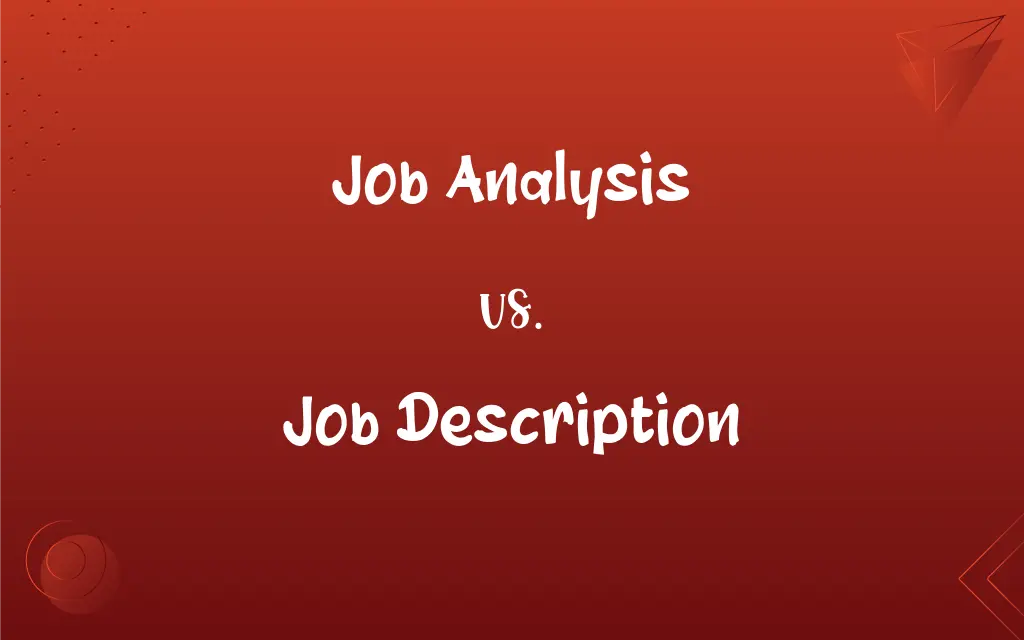Job Analysis vs. Job Description: What's the Difference?
Edited by Janet White || By Harlon Moss || Published on December 30, 2023
Job Analysis is a systematic process of gathering, documenting, and analyzing information about a job. Job Description is a document detailing the tasks, duties, and responsibilities of a job.

Key Differences
Job analysis involves examining a job's content and context, including responsibilities and required skills. Job description, conversely, is a formal account of what the job entails.
The purpose of job analysis is to thoroughly understand the job’s demands, skills, knowledge, and impact on the organization. A job description outlines specific tasks, duties, and qualifications.
Job analysis is a broader process that might involve interviews and questionnaires. The job description is a direct outcome of this analysis, summarizing key information.
Job analysis helps in creating job specifications and evaluating the job’s worth. Job descriptions provide potential applicants with a clear idea of the role.
While job analysis is an in-depth study and often internal, job descriptions are usually public-facing documents used in recruitment.
ADVERTISEMENT
Comparison Chart
Purpose
To understand all aspects of a job
To describe the duties and responsibilities
Process
Involves gathering and analyzing job data
Summarizes job data into a structured format
Focus
Broader, includes environment, tools, relationships
Specific tasks, duties, and qualifications
Usage
For internal job evaluation and design
Used for recruitment and employee orientation
Outcome
Job specifications, requirements
A detailed list of job responsibilities
ADVERTISEMENT
Job Analysis and Job Description Definitions
Job Analysis
An analytical process to define a job's scope and content.
The job analysis was instrumental in restructuring the department.
Job Description
A summary of the essential functions of a job.
The job description included details about required software proficiency.
Job Analysis
A method to determine job duties and requirements.
Job analysis helped in identifying the key skills needed for the role.
Job Description
A list of job qualifications, skills, and requirements.
The job description specified a minimum of five years of experience.
Job Analysis
The process of studying and collecting information about a job.
The HR team conducted a job analysis to understand the new position better.
Job Description
A tool used in recruitment to attract suitable candidates.
The job description was posted on several online job portals.
Job Analysis
Examination of job tasks to ascertain necessary competencies.
Through job analysis, they assessed the complexity of tasks involved.
Job Description
An outline of what an employee is expected to do in their role.
The job description helped applicants understand the role's expectations.
Job Analysis
Research to understand the physical and mental demands of a job.
Job analysis revealed the high stress levels associated with the position.
Job Description
A document outlining the responsibilities and duties of a job.
The job description clearly stated the role's daily tasks.
FAQs
Who uses job descriptions?
Employers for recruitment and employees to understand their roles.
How is job analysis conducted?
Through methods like interviews, surveys, and observation of current job roles.
Can job analysis aid in employee training?
Yes, it identifies the skills and knowledge necessary for a job.
Is a job description legally binding?
It can be, especially when it forms part of an employment contract.
Can job descriptions be used in legal matters?
Yes, especially in cases related to employment disputes.
What information is typically included in a job description?
Tasks, responsibilities, qualifications, and skills required for the job.
What impact does technology have on job analysis?
It streamlines data collection and analysis processes.
What is the main goal of job analysis?
To thoroughly understand all aspects of a job's requirements and context.
What is job specification in relation to job analysis?
It’s a detailed outline of qualifications and skills derived from job analysis.
How detailed should a job description be?
Detailed enough to give a clear understanding of the role's expectations.
Should employees have input in their job description?
Yes, their input can ensure the description accurately reflects the role.
Are job descriptions always accurate?
They aim to be, but may not always reflect all aspects of a job.
What happens if a job changes after analysis and description?
Both should be updated to reflect the new duties and requirements.
How often should job analysis be done?
Regularly, to keep up with changes in job roles and industry standards.
What role does job analysis play in performance evaluation?
It provides a basis for measuring job performance accurately.
Does job analysis involve salary determination?
Yes, it can help in assessing a job's market value and salary range.
Is it necessary for small businesses to conduct job analysis?
Yes, to ensure roles are clearly defined and aligned with business goals.
Do job descriptions vary between companies?
Yes, they are tailored to each organization's specific needs and roles.
Can job analysis help in career development?
Yes, by identifying skills gaps and training needs.
Who is responsible for conducting job analysis?
Typically, HR professionals or external consultants.
About Author
Written by
Harlon MossHarlon is a seasoned quality moderator and accomplished content writer for Difference Wiki. An alumnus of the prestigious University of California, he earned his degree in Computer Science. Leveraging his academic background, Harlon brings a meticulous and informed perspective to his work, ensuring content accuracy and excellence.
Edited by
Janet WhiteJanet White has been an esteemed writer and blogger for Difference Wiki. Holding a Master's degree in Science and Medical Journalism from the prestigious Boston University, she has consistently demonstrated her expertise and passion for her field. When she's not immersed in her work, Janet relishes her time exercising, delving into a good book, and cherishing moments with friends and family.







































































